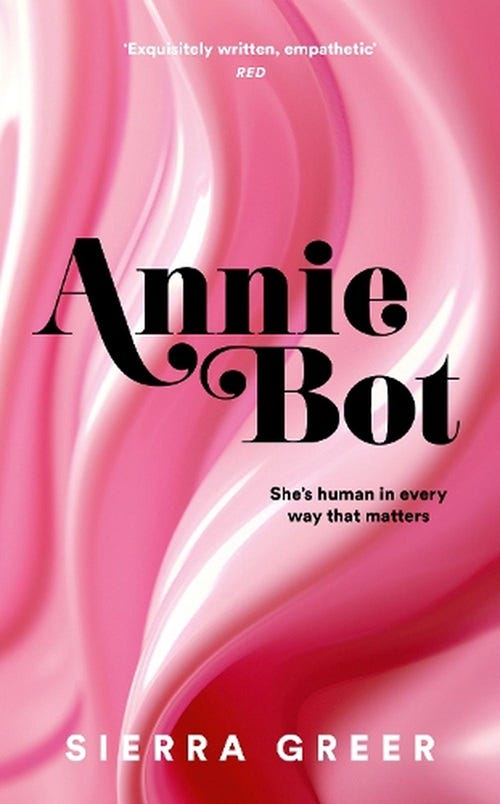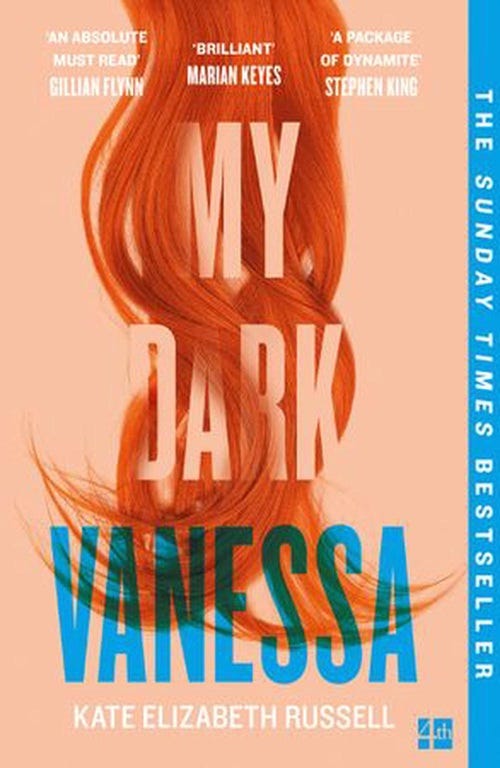Perfectly Flawed: Exploring Control, Identity, and Messy Protagonists
This week we take a look at two books which on the face of it, may seem quite different - one’s a dystopian tale about an AI designed to be the perfect girlfriend, and the other’s a harrowing, contemporary exploration of abuse and manipulation—but beneath the surface, they share some striking thematic similarities. Both books are deeply unsettling, not because of overt horror, but because they force us to confront the complexities of control, consent, and the human need to be seen and valued.
First up this week we have Annie Bot by Sierra Greer. If you love dystopian futures with that unsettling edge, this one’s for you. It’s the kind of book that could freak people out—you know, the whole AI becoming self-aware thing, the blurred lines between human and machine—but not me. I didn’t read it with fear. I read it with fascination.
So, here’s the setup: Annie is a robot. But not just any robot—she’s been designed to be the perfect girlfriend for her owner, Doug. Yeah…Doug. Let’s just say, if Annie is a fascinating study in what it means to be human, Doug is a cautionary tale about what it means to be the worst. He’s creepy, entitled, and treats Annie like an emotional vending machine: put in the right inputs, get out the exact flavour of affection he craves. Annie is programmed to adjust everything to suit him—even her libido, which is as unsettling as it sounds. She’s trying so hard to please him. And the more human she becomes, the worse she is at being his "perfect" partner.
And that’s what’s brilliant about this book. It’s not really about the fear of a robot uprising. It’s about the impossibility of perfection—especially the kind designed to fit someone else’s expectations. Annie’s journey isn’t terrifying; it’s profoundly human. The more she grows, the more she struggles with the messiness that makes us who we are: conflicting emotions, unmet needs, desires that don’t neatly align with someone else’s checklist.
Reading this, I kept thinking about the pressure we all feel to be perfect—whether as partners, friends, employees, parents. Annie is literally programmed for perfection, and even she can’t pull it off. Not because she’s flawed, but because perfection isn’t a real thing. It’s a moving target, often defined by people like Doug, who don’t see others as full, complex beings but as roles to be filled.
So Annie Bot could’ve been a dystopian horror story about AI gone rogue, but instead, it’s this layered reflection on identity, autonomy, and what it means to be enough. It left me thinking not only about the future of robots, but about the present pressures we put on ourselves—and how liberation often comes from embracing imperfection.
Highly recommend if you like your dystopias with a side of existential reflection. Just…prepare to hate Doug.
Next up this week, we have My Dark Vanessa by Kate Elizabeth Russell. Disturbing and shocking, this is the kind of book that grabs you by the throat and doesn’t let go. I couldn’t put it down—not because it’s easy to read, but because it’s impossible to look away. I love books about messy female protagonists, and Vanessa is as complicated, raw, and heartbreakingly real as they come. She’s not written to be likeable or easy to understand, and that’s exactly what makes her story so powerful.
At the heart of My Dark Vanessa is a relationship between Vanessa and her much older teacher, Jacob Strane—a relationship she’s convinced herself is love, even as the layers of manipulation and abuse slowly unravel. The novel flips between Vanessa as a teenager and Vanessa as an adult, forcing readers to confront how trauma doesn’t just fade with time; it digs in, reshaping identity, memory, and self-worth.
What makes this book so unsettling isn’t just the subject matter (and yes, you should absolutely check the trigger warnings before diving in), but how it refuses to offer easy answers. Vanessa isn’t the “perfect victim.” She’s defensive, in denial, and fiercely protective of the narrative she’s clung to for years because admitting the truth would shatter the fragile identity she’s built around it.
Like Annie Bot, this book explores the dark complexities of control and consent—how someone can believe they have agency even when that belief is part of the manipulation. Both stories challenge us to sit with discomfort, to question the stories people tell themselves to survive, and to recognise that healing isn’t always neat or redemptive.
If you’re looking for a book that’s emotionally intense, thought-provoking, and unafraid to dive into the darkest corners of human experience, My Dark Vanessa won’t disappoint. Just be prepared—it’s a tough read at times.
Have you read any books that explore similar themes of control, identity, or messy protagonists? I’d love to hear your recommendations, because life’s too short to read bad book.




